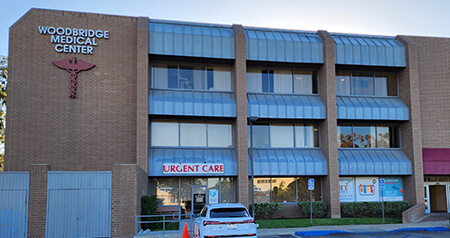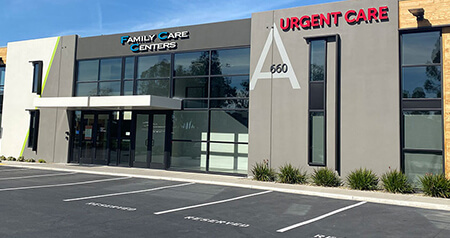

Fountain Valley Urgent Care Permanently Closed. We’re Here to Care for You at Our Other Locations.
Abdominal pain, a discomfort in the area between the chest and pelvis, affects about 11% of the global population. Seeking prompt medical attention for persistent or severe abdominal pain is crucial for proper diagnosis and treatment.
If you're dealing with abdominal pain, consider visiting our Family Care Centers walk-in clinics in Orange County, CA. Our team of certified healthcare providers is dedicated to offering personalized recommendations and compassionate care. Our urgent care clinics are open seven days a week, providing convenient service, and you can also use our online check-in to reduce wait times.

Understanding the potential causes of abdominal pain is essential for proper evaluation. Some common causes include:

At Family Care Centers Medical Group, our healthcare professionals will conduct a thorough examination to identify the cause of your abdominal pain. Based on the diagnosis, we will provide a tailored treatment plan and prescribe medications if necessary. If specialist care is needed, we can guide you to the most appropriate healthcare professional.
Contact us today for affordable and efficient abdominal pain care in Orange County, CA, serving communities in Irvine, Tustin, Santa Ana, Costa Mesa, and Huntington Beach. Your well-being is our priority.
Common causes of abdominal pain that may require urgent care include appendicitis, gallstones, kidney stones, severe indigestion, ulcers, infections, and inflammatory conditions like Crohn's disease or diverticulitis, which may require urgent care in the event of an acute flare-up or complication such as a bowel obstruction or infection. If the pain is sudden and severe, it could indicate a more serious issue that requires immediate attention.
You should seek urgent care for abdominal pain if you experience severe, sudden, or persistent pain, especially if it is accompanied by symptoms like vomiting, fever, changes in bowel movements, or difficulty breathing. If the pain doesn’t improve or worsens over time, it’s essential to get medical attention.
At urgent care, diagnostic tests may include a physical examination, blood tests, urine tests, and in some cases, a rapid pregnancy test for females of reproductive age. Depending on the symptoms and evaluation, the provider may also recommend imaging tests like X-rays to help diagnose the cause of the abdominal pain.
Urgent care can treat moderate abdominal pain, but if the pain is severe, persistent, or associated with symptoms like shock, difficulty breathing, or excessive vomiting, it’s recommended to go to the emergency room. Severe cases like ruptured organs or internal bleeding are better suited for ER care
Treatment options at urgent care for abdominal pain include medications for pain relief, anti-nausea medications, and rehydration solutions. The specific treatment will depend on the diagnosis. If further evaluation or specialized care is needed, urgent care will refer you to a hospital or specialist.
Yes, urgent care providers can prescribe medication for abdominal pain relief. This may include over-the-counter pain relievers like acetaminophen or ibuprofen, or stronger prescription medications if deemed necessary based on the severity of the pain.
Yes, abdominal pain can be a sign of a serious condition, such as appendicitis, a perforated ulcer, gallstones, kidney stones, or an infection like diverticulitis. If the pain is intense or accompanied by other symptoms like fever, vomiting, or blood in stools, it is important to seek urgent care.
Urgent care centers typically do not have ultrasound equipment on-site. However, some may offer X-rays for diagnostic purposes. If an ultrasound is needed to evaluate abdominal pain, you will likely be referred to a hospital or specialized imaging center.
The duration of an urgent care visit for abdominal pain can vary depending on the severity of the condition and the necessary tests. Generally, the visit could take anywhere from 30 minutes to an hour. If imaging or further tests are required, it may take longer.
If you have persistent or chronic abdominal pain, it’s advisable to visit your primary care physician or a specialist for a more thorough evaluation. Urgent care is designed for acute issues, and while they can address some persistent pain, chronic conditions often require long-term management by a doctor familiar with your health history.

We're Open Every Day!
Mon - Fri:
8AM - 8PM
Weekends & Holidays: 8AM - 5PM

We're Open Every Day!
Mon - Fri:
8AM - 8PM
Weekends & Holidays: 8AM - 5PM